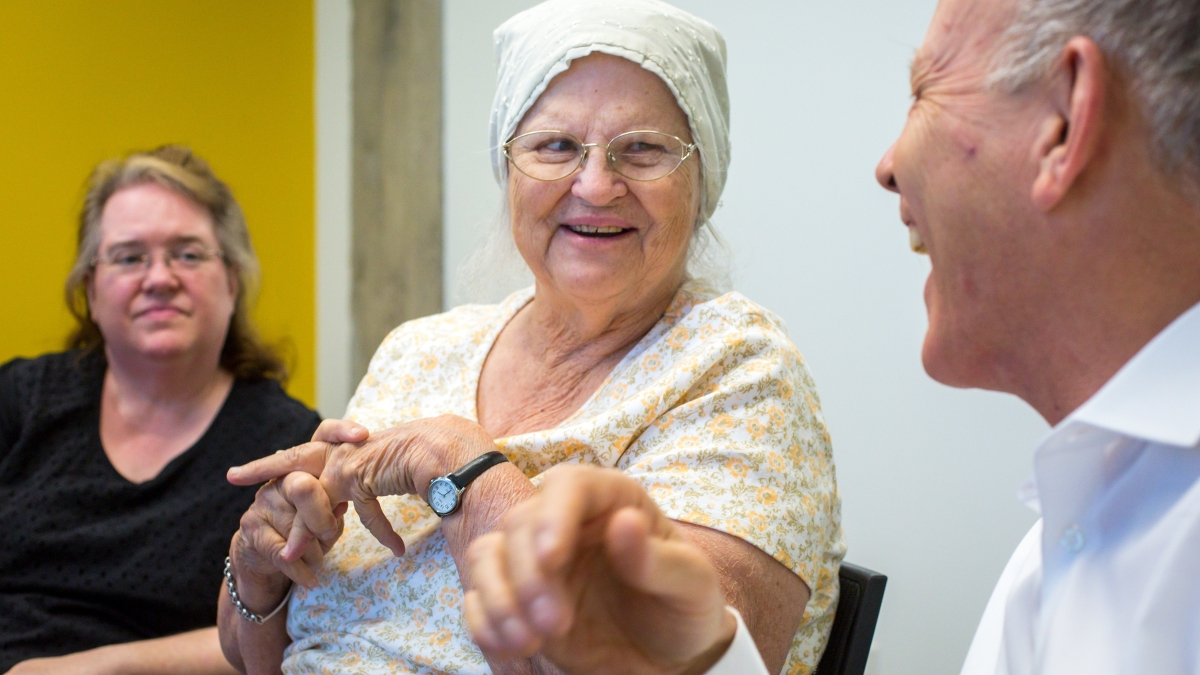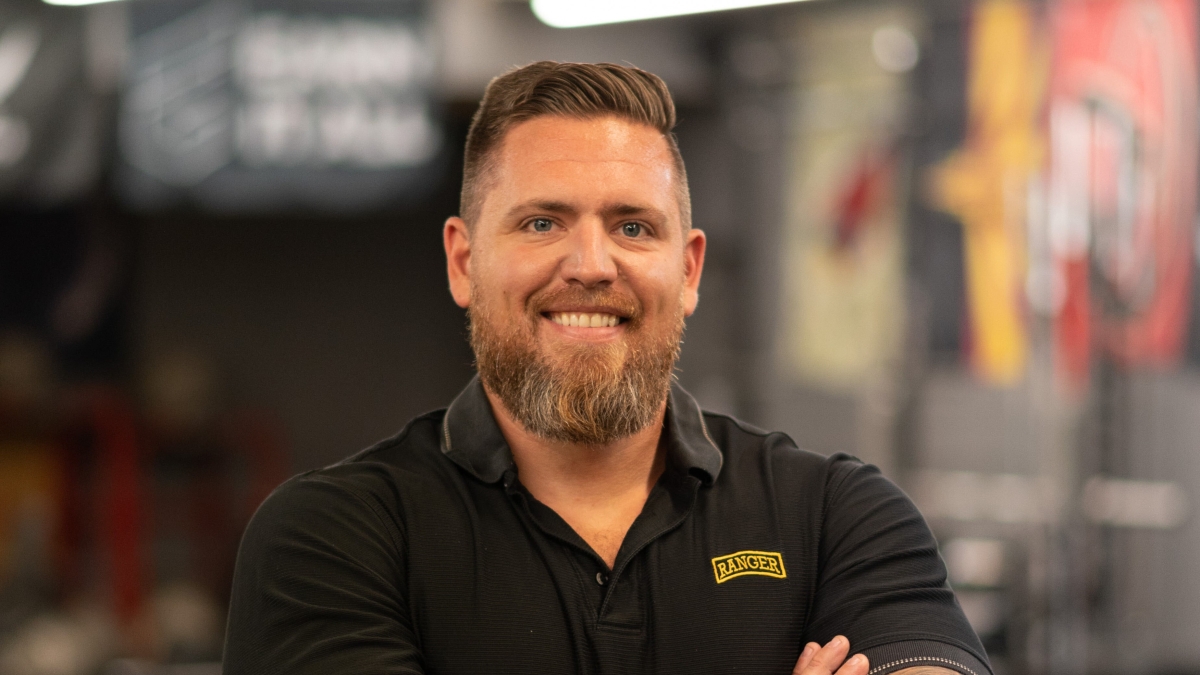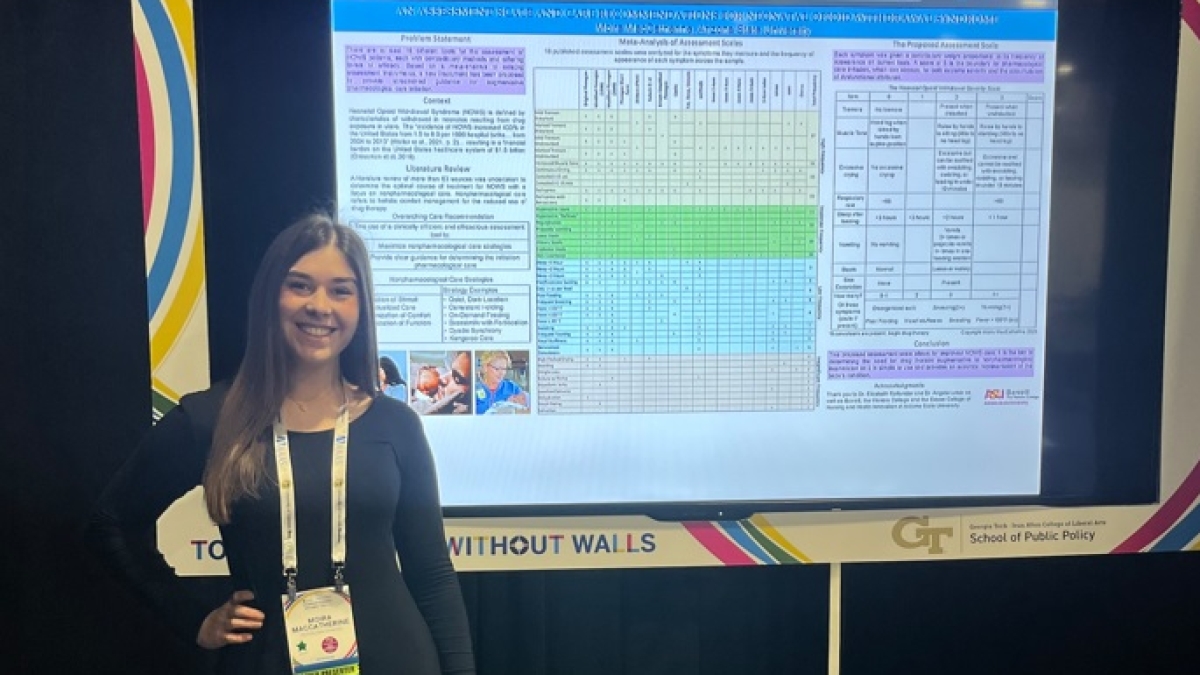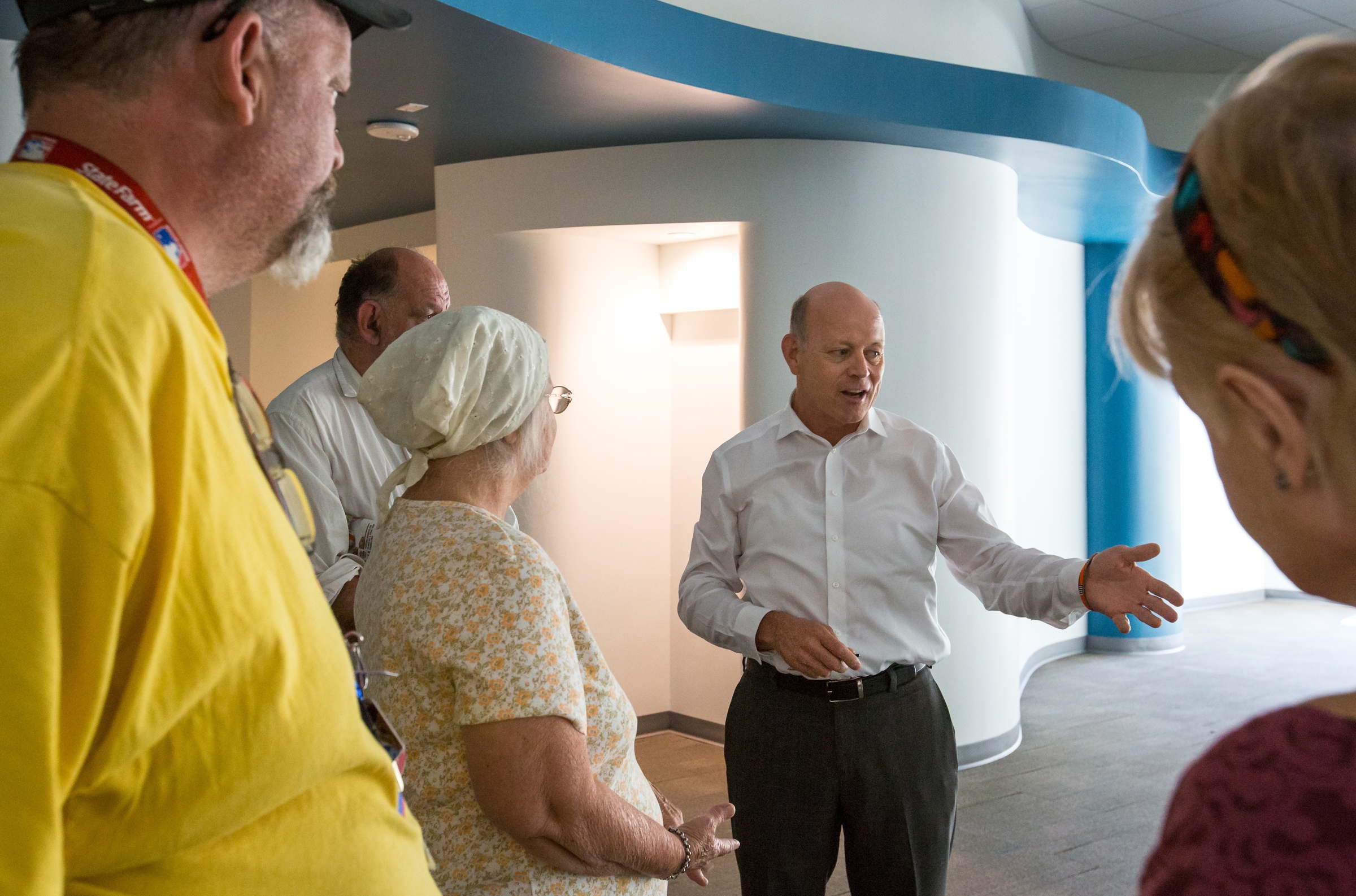A wider approach to health
New ASU space to provide Westward Ho residents with medical support, social events and human connection

Westward Ho resident Lee Hersey is thankful to have a roof over her head, food on the table and all of her medical needs met.
Despite that, she still feels there’s something lacking in her life.
Still active and highly social at age 70, Hersey (pictured above, center) says that although the Westward Ho is in the middle of a building boom and revival in downtown Phoenix, connection and interaction with the surrounding community is limited for her and the other 300 seniors who reside at the historic building.
She’d like to see that changed.
“I’m not the kind of person who can stay in my apartment all the time,” Hersey said. “I was raised on a farm, and I get so crazy being indoors, especially now that summer is here.”
That situation could be remedied through a new Arizona State University space called the Collaboratory on Central that will meet psycho-social and health promotion needs and offer other supportive services, but aims to go far beyond that, with plans for First Fridays exhibits, movie screenings, bingo nights, lectures, book clubs and live performances to engage residents.
One of the tenants of that space will be ASU's Center for Applied Behavioral Health PolicyThe center is a part of the College of Public Service and Community Solutions on ASU’s Downtown Phoenix campus and will share a space with the Center for Child Well-Being.. The center — which this month moved into 15,000 square feet on the first floor of the Westward Ho building — is taking a wider view of health for its clients, many of whom are indigent, elderly and disabled.
The 16-story landmark made its debut as Hotel Westward Ho in 1928 and was one of the Valley’s premier destinations and tourist attractionsThe site was frequented by celebrities and politicians, including presidents John F. Kennedy, Richard Nixon and Ronald Reagan as well as a gangster or two — including Ben “Bugsy” Siegel. The building was featured in movies such as “Bus Stop,” “Pocket Money,” and Gus Van Sant’s 1998 version of “Psycho.” for decades. Metro Phoenix residents knew it as a site for proms, weddings and gala events until it shuttered its doors in April 1980, converting to a low-income housing complex the following year.
Now it will also be a “teaching clinic” to the colleges and disciplines represented on ASU’s Downtown Phoenix campus, including nursing, nutrition, nonprofit and social work students.
An ASU flag flies across the street from the iconic Westward Ho, the new home for ASU’s Collaboratory on Central. The space’s tenants will strive to meet health promotion needs of residents, as well as offer engaging social events. Photo by Charlie Leight/ASU Now
The new inter-professional clinic seeks to enhance the quality of life of the residents, expose students to real-world learning experiences and provide faculty a fertile environment for research.
“About three years ago, a doctoral student named Chris Fike and I conducted a study and surveyed about 50 of the tenants, and one of the surprising finds was they had good access to health care,” said Michael Shafer, director of the Center for Applied Behavioral Health Policy and a professor in the School of Social Work.
“We then took some standardized tests of loneliness and sense of neighborhood and community and discovered they were lacking in this area. These folks feel lonely, isolated and disengaged, and we discovered there are some gaps in services that ASU can provide.”
Shafer hopes those gaps can be bridged through a variety of supportive services ASU will offer, spearheaded by more than 180 student interns and volunteers and supervised by faculty.
Services will include counseling and referral services, community organization assistance and support to the Tenant Advisory Council, health monitoring and wellness promotion, and educational and enrichment activities such as lectures, art exhibits and student performances.
At the centerpiece of the renovation is the Art Deco-style Concho Room, a once-glamorous cocktail lounge where entertainment icon Wayne Newton and his brother Jerry played for Valley residents and where it was rumored that gangster Benjamin “Bugsy” Siegel wet his whistle on a stop through Phoenix. Not only will the new space be the hub of planned social activities for tenants, but it will provide a gathering space for health and human service professionals and organizations, conferences and workshops and public events hosted by ASU.
“ASU trains about 5,000 people a year in the behavioral-health fields, and we now have space that can accommodate about 150 people for smaller conferences and workshops,” Shafer said. “We plan on using that space heavily and make everyone in the community aware of what we do at ASU.”
Michael Shafer, director of the Center for Applied Behavioral Health Policy, gives Westward Ho residents a tour of the renovated Concho Room, part of the new the Collaboratory on Central space. Shafer hopes the a variety of supportive services ASU will offer in the space will help residents feel less isolated and more engaged. Photo by Charlie Leight/ASU Now
You don’t have to make resident Mary Mallory, who has lived at the Westward Ho for the past 15 years, aware of ASU’s presence on the property. She is looking forward to the Westward Ho coming alive again with more planned activities and social events.
“I’m looking forward to learning more about computers,” said the 67-year-old Phoenix native. “Even though I have one, I don’t know what to do with it. Knowing the ins and outs of the computer would be great.”
Robin Bonifas, an associate professor in the School of Social Work, said the center will include a variety of counseling and support groups and provide a level of outreach tenants will be pleased with.
“In addition to counseling and support, we plan on doing more health assessment and more linkage with their primary-care provider so there’s a more collaborative effort in their care services,” Bonifas said. “They’ll be healthier in a lot of ways because now they’ll be engaged in something meaningful and with people who care about them.”
Shafer said Westward Ho residents just won’t be helped by the clinic — they’ll be giving back to the university in many ways.
“Many of our students don’t have grandparents or connections with elderly people, and this will give them an opportunity to know someone else from another generation,” Shafer said.
“Those relationships will become valuable to them as they become nurses and social workers. Letting them (work with) with the elderly and disadvantaged will get our students connected at the heart.”
Top photo: Longtime Westward Ho resident Lee Hersey (center) talks with Michael Shafer (right) and Robin Bonifas at the new home for the Center of Applied Behavioral Health Policy in the renovated lobby of the Westward Ho on Thursday, June 2. Shafer is the director of the Center for Applied Behavioral Health Policy. Bonifas is an associate professor in the School of Social Work within the College of Public Service and Community Solutions. Photo by Charlie Leight/ASU Now
More Health and medicine

Tips for staying hydrated during Pat's Run and other outdoor activities
By Aidan Hansen Staying hydrated and listening to your body during outdoor exercise activities is crucial to one's health and safety, especially in warm climates. And with the average daytime high…

Fitness helped combat vet, ASU alum readjust to civilian life
By Aidan Hansen Army combat veteran and Arizona State University College of Health Solutions alumni Rich Mulder found fitness helped him transition back to civilian life. Now he supports his fellow…

Nursing student wins top award for research on neonatal opioid withdrawal
An experience Moira MacCatherine had as a teenager volunteering in a Level III neonatal intensive care unit impacted her in such a way that it would later inspire her research as a nursing major at…

